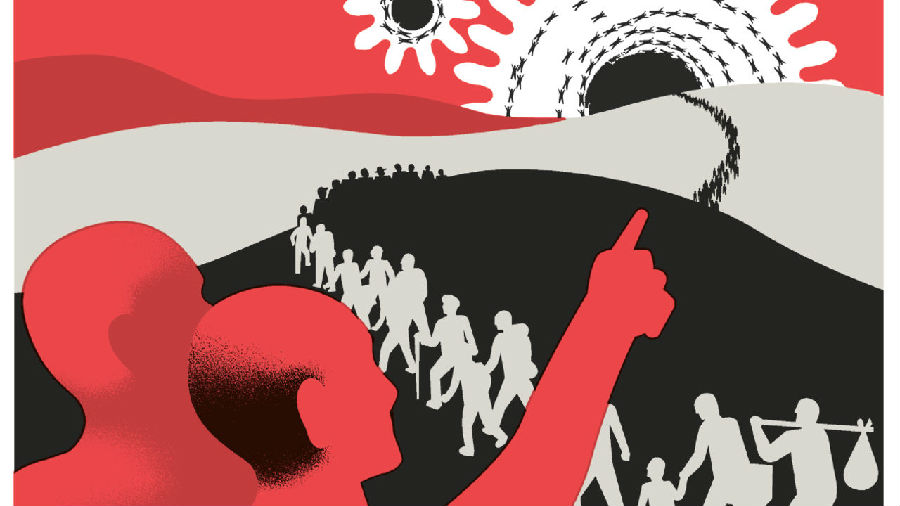For centuries prior to the Industrial Revolution, Asia's massively populous societies made the continent the world's centre of economic gravity.
工業(yè)革命幾個(gè)世紀(jì)前,亞洲的人口大國(guó)使這片大陸成為世界經(jīng)濟(jì)重心。
Industrialisation in Europe and North America in the 19th century briefly knocked it from its perch.
19世紀(jì),歐洲和北美工業(yè)革命暫時(shí)將其擠下高位。
But now their collective economic might, measured in real output on a purchasing-power-parity basis,
但現(xiàn)在截止到2020年,他們的集體經(jīng)濟(jì)(以購(gòu)買(mǎi)力平價(jià)基礎(chǔ),計(jì)算其實(shí)際產(chǎn)出)
is forecast to account for more than half of global production by 2020.
預(yù)計(jì)可能占全球生產(chǎn)的一半多。
Was the West's period of dominance an anomaly, which could only ever have been short-lived? Is population destiny?
西方的支配時(shí)期只是個(gè)短暫存在異類么?人口即命運(yùn)么?
It stands to reason that countries with larger populations might enjoy long-run economic advantages.
顯然人口較多的國(guó)家可能享有長(zhǎng)期的經(jīng)濟(jì)優(yōu)勢(shì)。
People are the raw material of economic growth, after all. The more there are, the greater the likelihood that one becomes a Gutenberg or a Watt.
畢竟人口是經(jīng)濟(jì)增長(zhǎng)的原料。人口越多,就越有可能出現(xiàn)古騰堡或瓦特這類人。
In a world without much international trade, populous countries offer the largest markets,
在一個(gè)沒(méi)有太過(guò)國(guó)際貿(mào)易的世界中,人口大國(guó)提供最大的市場(chǎng)

and comparatively more opportunity to boost economic output through specialisation and trade.
以及相對(duì)更多的機(jī)會(huì),可以通過(guò)專業(yè)化和貿(mào)易促進(jìn)經(jīng)濟(jì)產(chǎn)出。
Projecting economic growth rates is fantastically hard even over very short time horizons; over centuries, it is as good as impossible.
預(yù)測(cè)短期內(nèi)的經(jīng)濟(jì)增長(zhǎng)率非常困難;幾個(gè)世紀(jì)更是近乎不可能。
But there are worse strategies than betting on the places with the most people.
但還有比把賭注壓在人最多的地方更糟糕的策略。
Klaus Desmet of Southern Methodist University, David Krisztian Nagy of CREI, a research institute,
南衛(wèi)理工會(huì)大學(xué)的Klaus Desmet,研究機(jī)構(gòu)CREI的David Krisztian Nagy
and Esteban Rossi-Hansberg of Princeton University do just that.
以及普林斯頓大學(xué)的Esteban Rossi-Hansberg正是這么做的。
In a paper that last month won them the Robert Lucas prize, which recognises excellent research in political economy,
他們上個(gè)月發(fā)表的論文獲得了羅伯特·盧卡斯獎(jiǎng),該獎(jiǎng)項(xiàng)是表彰政治經(jīng)濟(jì)中的杰出研究,
they build a model that yokes economic performance to population size,
他們建立了一個(gè)模型,將經(jīng)濟(jì)表現(xiàn)和人口規(guī)模相結(jié)合,
within which they can run time forward by hundreds of years to watch the balance of economic power change.
通過(guò)該模型,他們可以將時(shí)間推進(jìn)幾百年以觀測(cè)經(jīng)濟(jì)實(shí)力變化的平衡。
Long-run growth, they suggest, is driven by improvements in technology.
他們認(rèn)為長(zhǎng)期增長(zhǎng)是由技術(shù)的改善所驅(qū)動(dòng)的。
And more populous countries should accumulate more innovation than smaller ones do
人口越多的國(guó)家應(yīng)該比人口較少的國(guó)家積累更多的創(chuàng)新
because the return on developing a new technology is higher—there are more people to buy Edison's light bulb and to enrich Edison,
因?yàn)榘l(fā)開(kāi)一項(xiàng)新技術(shù)的回報(bào)更高—有更多的人會(huì)去購(gòu)買(mǎi)愛(ài)迪生的電燈泡并讓他變得富足,
and therefore more incentive to invent the light bulb in the first place.
因此發(fā)明電燈泡的動(dòng)機(jī)就越多。
譯文由可可原創(chuàng),僅供學(xué)習(xí)交流使用,未經(jīng)許可請(qǐng)勿轉(zhuǎn)載。












